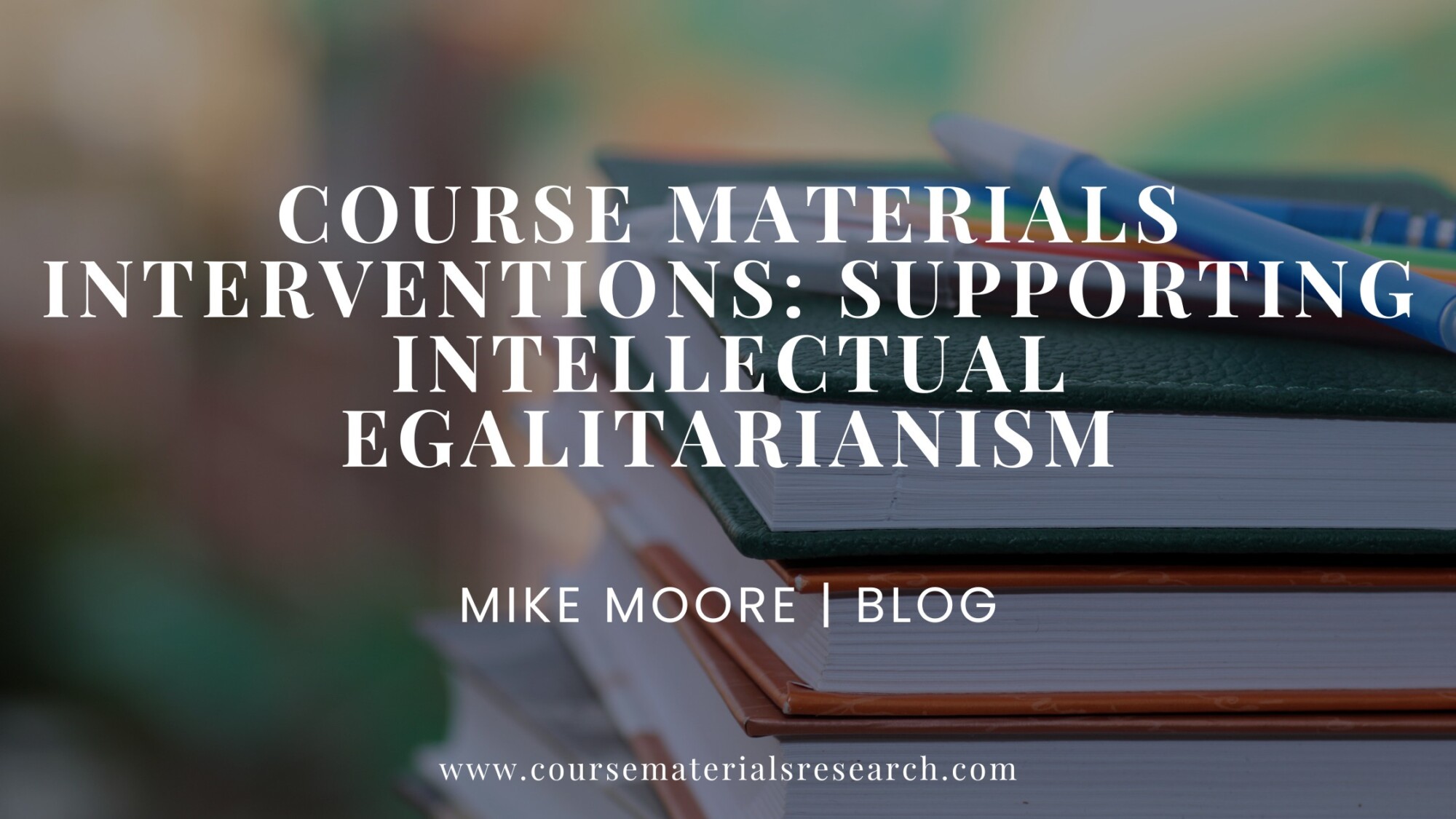Course Materials Interventions: Supporting Intellectual Egalitarianism

Course Materials Interventions: Supporting Intellectual Egalitarianism
If you have ever seen/heard me present, one of the most important parts of my presentation is my favorite quote from Lester Frank Ward, “The thing that is rare is opportunity, not ability”. Ward is credited with leading the efforts to make sociology an academic discipline in higher education in the United States. His work also furthered the concept of intellectual egalitarianism. He argued that providing equal access to education was critical to creating a more equitable society and addressing the inequalities of that society. He believed that educational opportunities should be accessible to everyone, regardless of their social or economic standing. It is my opinion and belief that ensuring access to course materials, regardless of acquisition or delivery model, for every student is a partial fulfillment of Ward’s quest for intellectual egalitarianism.
Egalitarianism
Before we can understand intellectual egalitarianism, we need to understand the concept of egalitarianism. Egalitarianism is a social, political, and philosophical tenet that advocates for equality among all people. The concept encompasses a wide variety of theories and movements that support the idea that all individuals should have equal rights, opportunities, and access to resources, regardless of their social, economic, and/or cultural background. Egalitarianism has had a significant influence on social and political movements like the feminist movement, civil rights movement, and LGBTQ rights movements. Essentially, it is the foundation for anyone advocating for social justice and equality.
Intellectual Egalitarianism (IE)
The Ward quote is so poignant for me is because intellectual egalitarianism is the belief that all individuals (read students) have equal potential for intellectual development and the capacity for knowledge and understanding. Furthermore, it suggests that human intelligence is not fixed and with the right opportunities and environment, people (read students) can develop their intellectual capacities. This is obviously in contrast to those who believe that specific individuals or groups are innately superior (discrimination, prejudice, racism) in terms of intelligence or cognitive abilities. Intellectual egalitarianism supports the idea that everyone should have equal access to educational opportunities and intellectual resources regardless of social background, economic status, race, or gender.
Course Materials and IE
As I said before, my belief is that increasing access to course materials for all students is a partial fulfilment of the intellectual egalitarianism Ward inspired with his work. Inclusive Access and other revolutionary course materials intervention models are the manifestation of modern-day intellectual egalitarianism in higher education. These revolutionary interventions aim to provide access to course materials to all students regardless of their social background, economic status, race, gender, or any other identifying characteristic . As these course materials intervention models remove barriers to course materials for students, they fulfill the notion that when equally resourced, all students have the potential for intellectual development and capacity for knowledge/understanding. To support this, I draw on my own research that indicates increased access to course materials can impact student outcomes.
Course Materials and IE in Practice
My conviction, regardless of strength, is insufficient. So, here are a few ways increased access to course materials promotes intellectual egalitarianism in higher education. This list is not intended to be exhaustive, but provoke thought:
Reducing Financial Barriers
The historically high costs of course materials have disproportionately affected students from lower economic backgrounds. The impact of high costs has limited their access to necessary educational resources. Inclusive Access, and similar interventions, aim to reduce financial barriers by making course materials more affordable and accessible, thus promoting a more equitable learning environment.
Empowering Underrepresented Groups
Course materials interventions like Inclusive Access can support historically underrepresented student groups like first-generation students, students from low-income backgrounds, and students with disabilities by making course materials more accessible. Increased access to essential learning resources helps create a more level educational playing field. This allows underrepresented students groups to overcome some of the systemic higher education barriers that may otherwise limit their educational opportunities. This may be the mot important aspect of intellectual egalitarianism in higher education because the current “find and acquire” course materials models prevent certain student populations from choosing their preferred major or courses because of the course materials barrier.
Social Mobility
Traditionally, higher education has been seen as a key driver of social mobility. Increased access to course materials can contribute to this by providing all students with the resources necessary to succeed. When students have equal access to knowledge, resources, and course materials, they are better positioned to seek high-paying careers.
Wrap Up
Increased access to course materials creates a more equitable and just learning environment where all students can succeed and contribute to the collective intellectual growth of society. Intellectual egalitarianism is a concept. A goal. Something to strive for. While not everyone will agree with the adoption of an egalitarian model of society, we can all agree that having access to education should not be reserved for those with resources or born into a certain demographic. As course materials stakeholders, we can create a more equitable and level educational experience for all students by ensuring they have access to the requisite course materials and learning resources.
As always, thanks for checking in and I’ll see you next time.
-MM

